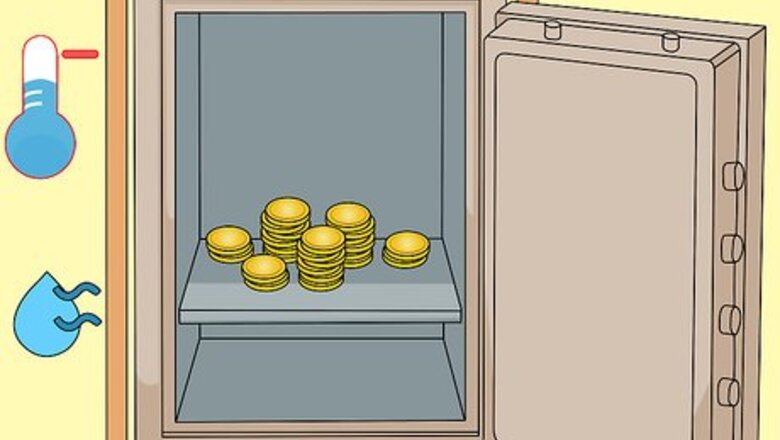
views
Preparing Your Gold for Trade
Understand the difference between bullion and numismatic values of gold. Bullion refers to the value of the gold in the coin itself. This value remains the same regardless of the type of coin or ingot. Certain coins sought after by collectors gain a numismatic value that can be far beyond their bullion value because of their age or rarity.
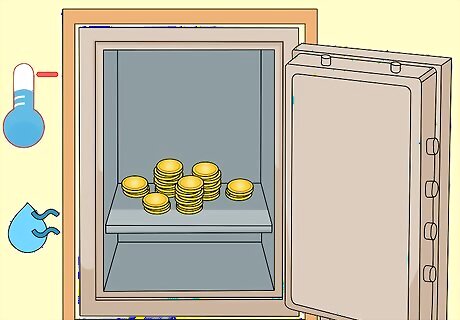
Minimize handling your gold coins. Any scratches, nicks, stains, and fingerprints can significantly reduce their value, so take every precaution to protect your gold coins. Avoid cleaning your gold because cleaning decreases its value. As with any valuable assets, keep them locked up and secured. Consider using plastic coin protectors to prevent damage from handling. Keep your gold stored in a cool, dry place. Avoid heat and moisture, as it can deteriorate the metal.
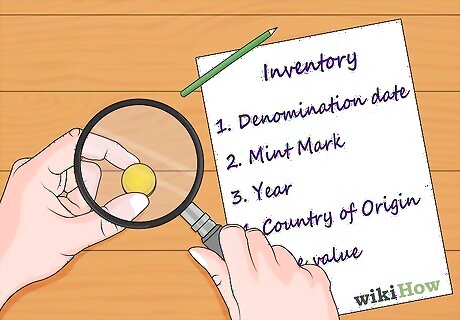
Take inventory of your collection. Some coin collectors seek particular pieces, so you need to know what type of coins are in your collection. Even if you decide to do business with a general coin dealer or collector, having a good inventory list will be helpful for them on deciding whether they would be interested in your pieces. It may be helpful to obtain an up-to-date pricing guide for precious metals and for the numismatic value of any old or rare coins you might own. Your gold coins should be listed by denomination, date, and mint mark to make it easier for the dealer to sort through the collection to give you an appropriate appraisal value. Study each coin's inscriptions with a magnifying glass to determine the year, country of origin and face value. When cataloging, keep the same country together in the list, preferably in alphabetical order. To find the value of your gold coins you can look them up in the United States Coin book. Both the red book and the blue book let you know of the value of gold coins to help better prepare you as you get ready to sell them.
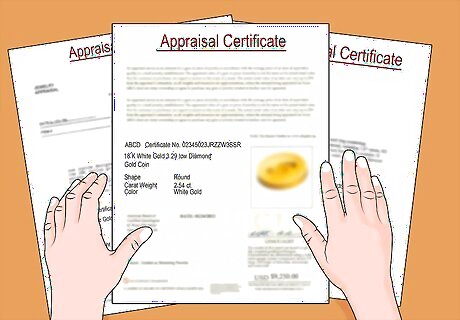
Appraise your coin collection. Whether you have one coin or 100, don't sell or trade gold coins without an unbiased professional appraisal. Go to your local pawnbrokers or coin dealers and get estimates on the value of your gold. Try to get about three or four appraisals so you can compare them and have a good estimate on the worth of your gold. The appraised value of a gold coin may be far greater than you suspect. If you have coins with numismatic value make sure they are appraised for this value and not just their value as bullion. Getting more than one appraisal reduces your risk of being low balled by one buyer of your gold coins. If you have a few estimates with you as you go to sell, you are in a better position of declining any offer to buy your gold at less than its value as you have the proof you could get more money for your coins.
Weighing Your Options for Trading Your Gold
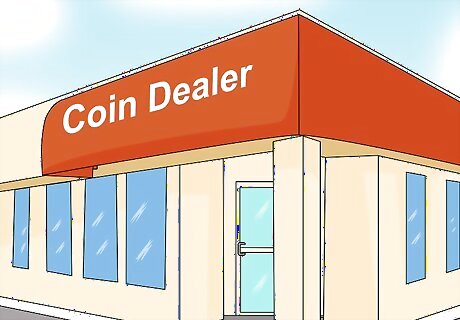
Sell them to a coin shop. Going to your local coin dealer is a good choice because there’s the chance that this is the same dealer whom you purchased your collection from before. There is already an established relationship, which would mean the transaction can be quick and efficient as both parties are already familiar with the collection and its value. In the event the local dealer is someone whom you haven’t dealt with before, it could still be advantageous to deal with someone face to face. Dealing with someone in person enables you to have open communication and handle issues quickly. You will most likely receive less than the fair market price if you deal with a local shop dealer. You can negotiate their asking price - keep in mind that they are there to make a profit. A fair range is between 20-40% less of what your gold coins are worth. If at any time during the selling process you feel as though you are being cheated, you feel uncomfortable, or negotiations become too heated, leave and go someplace else to sell your gold.
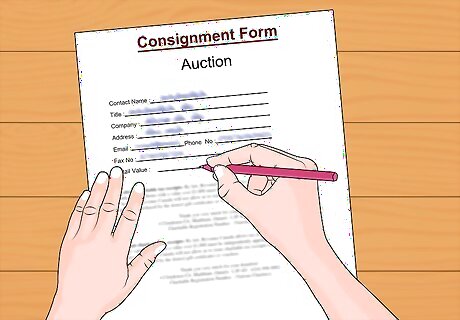
Sell them at a traditional auction. Find a local auction to display and sell your gold coins. Auctions charge a fee for their service. The fee is either a flat rate or a percentage of how much your coins end up selling for, depending on the auction and the size of your collection. To sell your coins through an auction, you’ll need to fill out a consignment form, turn it in with your coins, and wait until you receive an offer on your coins. One thing to keep in mind is if you sell through an auction, you'll have to settle for the highest bid. While an individual coin collector is likely to offer you the best price, it may take more time and effort.
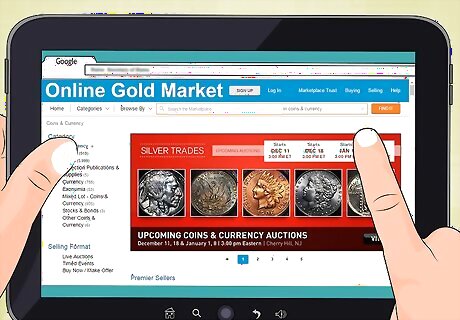
Sell them at an online auction or marketplace. If you are looking to get the most back in value for trading your coins, selling them online is the best route to go. You also have the flexibility of trading one coin at a time or a collection, depending on how you want to trade your coins. This option is the most flexible as there are no time restraints and you set the pace of the transaction. If you are not familiar with how computers work or how to transact a sale online, this may not be the best option. With any online transactions, you are dealing with unknown persons and must exercise caution and care. A couple of online sites that offer fair rates for their services are Great Collections and Heritage Auctions Avoid websites that charge excessive fees to post and sell your coins, such as eBay.
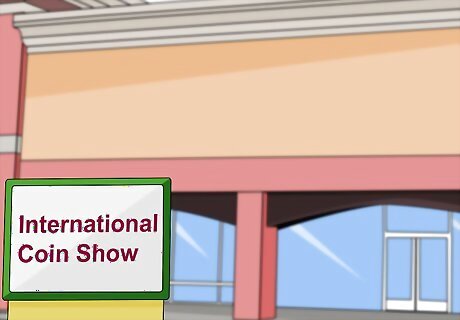
Sell them at a coin show. Taking your coins to a show can be advantageous to you if you have individual coins you want to trade in. If you have a rare coin that you have wanted to trade in and you know there will be a specialist at the show, selling at the show would be your best bet. For example, if you have a 1902 Lincoln and you know the famous Lincoln collector/dealer will be at the show, you should go see them. If you have a higher quantity of coins you want to sell, a coin show may not be the best option. Dealers have to calculate their shipping and storage fees so showing up with a large amount of coins could hurt your chances of selling them. Instead, make a pre-arranged meeting or appointment so they can expect your arrival and better calculate their costs.
Taking Precautions as You Trade Your Gold
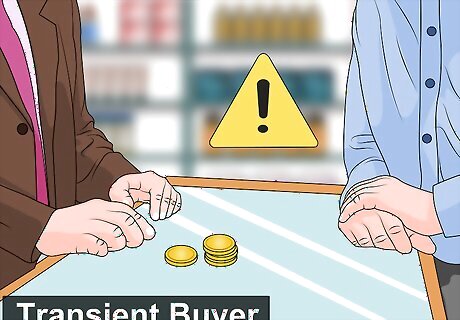
Be cautious of transient buyers. Be careful and avoid rogue buyers. These are buyers who pop up in town and set up shops in random places, such as a hotel or a warehouse. They offer you much lower prices that seem appealing if you are in a rush to sell your coins quickly. With anyone you are considering selling your gold to, it may be a good idea to check the Better Business Bureau to see if they have any complaints against them.
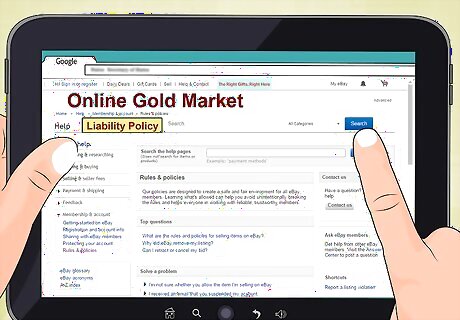
Read the fine print. If you are considering selling your gold online and need to ship it to them, always read the contract and what it entails. Look at their liability policy, in case your gold gets lost or stolen. Read how much shipping rates cost, as they could be really high, especially in proportion to the amount you are getting for the actual gold.
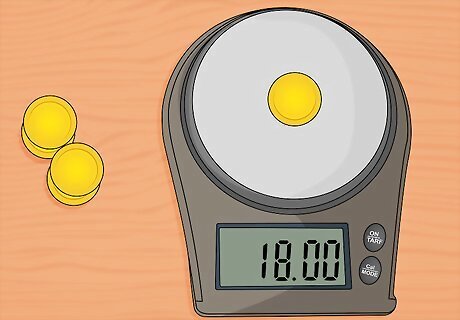
Look at the scale. Pawnshops and coin dealers will weigh your gold using a scale that has been reviewed by a local agency to ensure accuracy. When dealing with a rogue buyer make sure they are accurately weighing your gold so you get the correct value of your gold in cash. Gold is not valued by an ordinary ounce (28 grams), instead it is measured by Troy (31.1 grams). Make sure when you are doing your research on your appraisals that you are getting measured by the correct value so you are getting an accurate estimate.












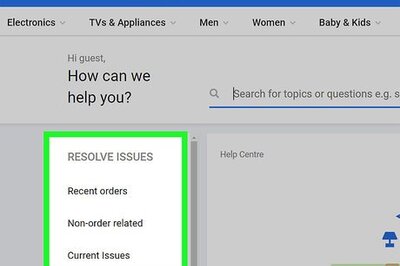
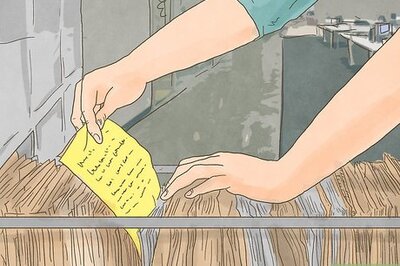



Comments
0 comment